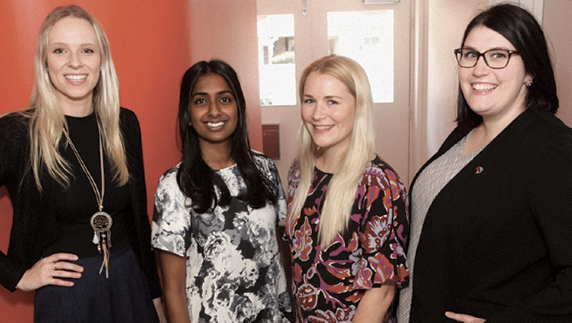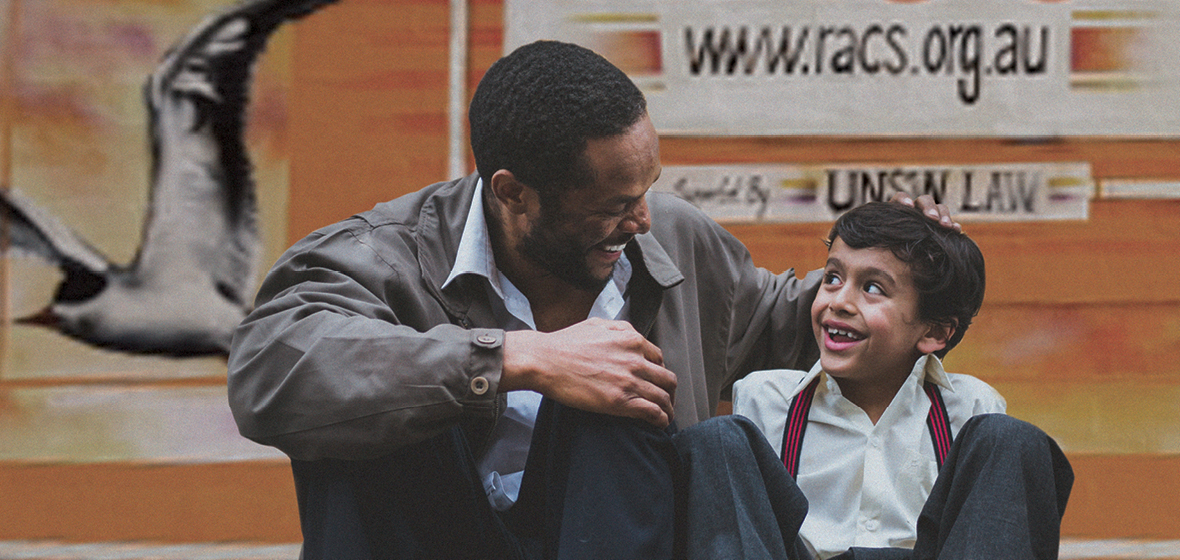Rapidly changing and often hostile policy environments challenge RACS staff and solicitors attempting to generate certainty for asylum seekers.
Sarah Dale has a knack for remembering her clients – their names, dates of birth, countries of origin, and stories of escape. But as Principal Solicitor at the Refugee Advice and Casework Service (RACS), it’s not the memories of those she helped get a positive outcome that stick with her; it’s the clients who had their applications refused.
“With people who have been granted a visa, you can breathe out and say, ‘Thank goodness’,” says Dale. “But the stories that remain most in my mind are those who are refused. You get a lump in your throat when you hear the outcome because suddenly you’re wondering whether there was more you could have done and where they’ll go now.”
Changes to Australian migration law mean Dale isn’t able to relax even if a visa is granted, because there are no longer permanent settlement options for some refugees. “With temporary protection visas and safe haven enterprise visas, we’re only breathing out for three years as we expect to see the clients again when they reapply for another temporary visa,” says Dale. “It’s a real shift in mentality for us as lawyers.”
RACS is one of the largest community legal centres in Australia. For 30 years, the organisation has provided free legal advice to refugees and people seeking asylum in Australia. The service has a team of about 25 lawyers and 10 support staff.
Former Justice of the High Court of Australia Michael Kirby and the former president of the Australian Human Rights Commission, Professor Gillian Triggs, became the patrons of RACS in October. At the time Kirby said, “We can go to great conferences, and we can talk forever about the rule of law, but the test of it comes when you’re dealing with the most vulnerable.”
Dale has been RACS’s permanent Principal Solicitor since 2017 after working for four years as RACS’s Child Specialist Lawyer, responsible for assisting unaccompanied children.
Aged 30, she is emblematic of the organisation. More than 85 per cent of the staff is under 35 and the legal team is 75 per cent female. They run clinics, visit detention centres, and engage in policy work, including Senate submissions.
“Fundamentally, we’re lawyers whose job it is to ensure people put their best case forward, to preserve a person’s rights to apply, and to ensure their rights are upheld in that process,” says Dale.
“We’re helping people with life or death situations and I constantly say I don’t know what I will do in the future that is more important than what I’m doing now.”
Dale believes not everyone who comes to Australia is owed protection, but she’s firm in her conviction that it’s RACS’s job to fight for those they believe do need protection. And she says hundreds of people owed protection aren’t being given it purely because the law has changed.
“Australia has removed itself from the 1951 Refugee Convention. We’ve now got our own domestic legislation [governing the rights of refugees],” she says. “For us, as lawyers, it’s not an issue of politics – it’s an issue of humanity and it’s about giving people a chance and helping them access their human rights.”
While there’s satisfaction in seeing the difference RACS makes, there’s little glamour in the job.
“About 95 per cent of our job is paperwork, like every other lawyer, and it’s filling in a 30-page form over and over again,” says Dale.
And with such a protean policy environment, laying out a strong strategic map for the future can be fraught.
Thulasi Wigneswaran knows this only too well. Wigneswaran coordinates the RACS Legal Help for Refugees Clinic, which is responsible for assisting fast-track applicants who otherwise would have no access to legal assistance.
Early this year, as she was scrolling through her social media feeds on a quiet Sunday evening, Wigneswaran noticed an official announcement outlining a foreshortened deadline for an application she was working on.
“I rang my boss, Alison [Ryan], and just said,
We all grew up knowing and studying international law, now that has disappeared in Australia. And for us, as lawyers, it’s not an issue of politics, it’s an issue of humanity and it’s about giving people a chance and helping them access their human rights.
SARAH DALE,
Principal Solicitor, Migration Agent
‘What are we going to do?’ It can be extremely reactive work, which makes it difficult to plan for our clients’ needs in the longer term.”
Wigneswaran and Ryan set up the clinics in 2015 in a single room at the University of Technology in Sydney. In the beginning, they wondered if being open only on Monday nights would be enough. Within a short time, numbers demanded they also open on Wednesday nights. Now the clinics run on Monday and Wednesday nights, and weekends in a number of locations across the city and Western Sydney.
Wigneswaran now is responsible for coordinating thousands of clients and hundreds of volunteer solicitors, migration agents, interpreters and students. Over the past two-and-a-half years, the clinic has seen 4,250 clients who arrived via boat after 13 August 2012 and it has helped 1,783 clients submit applications. In addition to RACS solicitors, more than 800 volunteers have helped in this effort. And when RACS received just a few months’ notice for the application deadline, it received substantial financial donations from the Vincent Fairfax Family Foundation and other organisations, while 10 law firms provided pro bono legal and interpreting support.
“In the beginning, it was just about seeing who wanted our help,” says Wigneswaran. “Now, it’s become an incredible collaborative effort and it’s been great to see the public support. Since we started, it’s just been policy change after change after change. And each change can fundamentally affect the make-up of the clinics, right down to the language groups we need to prioritise.”
Similar to the way the clinics grew in response to the changing landscape, the RACS team has also expanded. When Melisa Cicak started as an intern at RACS five years ago, there were 10 employees. She worked on family reunion advice and helped with citizenship applications. When Cicak graduated, she took an administration job with RACS and, for the past three years, has been a solicitor across a number of teams.
Beyond the purely legal aspects of her work, chronicling the experiences of clients involves a delicate balance of seeking information while being empathetic to their often tragic past.
“Having to make clients talk about traumatic events is almost as if you’re re-traumatising them,” says Cicak. “When they go to the department, they have to tell their story, then they have to tell it to us, and then they’ll get another interview and have to go through it again. If I see that it’s really affecting the client, I’ll be more gentle and just use yes or no answers. You try to make it as comfortable as possible.”
But it’s not just being aware of the client’s emotional condition that is important. RACS staff members also need to be sensitive to their own state.
“Listening to people takes a toll on our mental health,” says Cicak. “Everyone reacts differently. We get mental health training and we debrief together. I try not to do too much work-related stuff outside of work hours, to give myself a break.”
Isobel McGarity, another RACS solicitor, has learnt to employ a range of techniques with people who have been victims of trauma.
“You need to develop a rapport or trust because you’re asking them to tell you incredibly personal stories straight off the bat,” she says.
“You can’t let any frustration with time get in the way and you need to know when to take a break or bring it back to an everyday level.
“Though some client stories are harder, and women who have had a number of sexual assault claims bother me more than other stories.”
McGarity admits hearing people’s stories, dealing with an often hostile policy environment, and working long hours can wear people down. She’s also decided that, while her family and most of her friends are supportive of her work, Facebook is not the place she needs to fight the good fight.
“It’s a pretty special workplace,” she says. “You can make such a substantial difference to the way that someone engages with the process and have an effect on the outcome of that process. And being supportive of people who have had a really difficult time. These aren’t faceless clients – they’re human beings that have laid it all out before you.”
Photography: Sebastian Leon Prado





